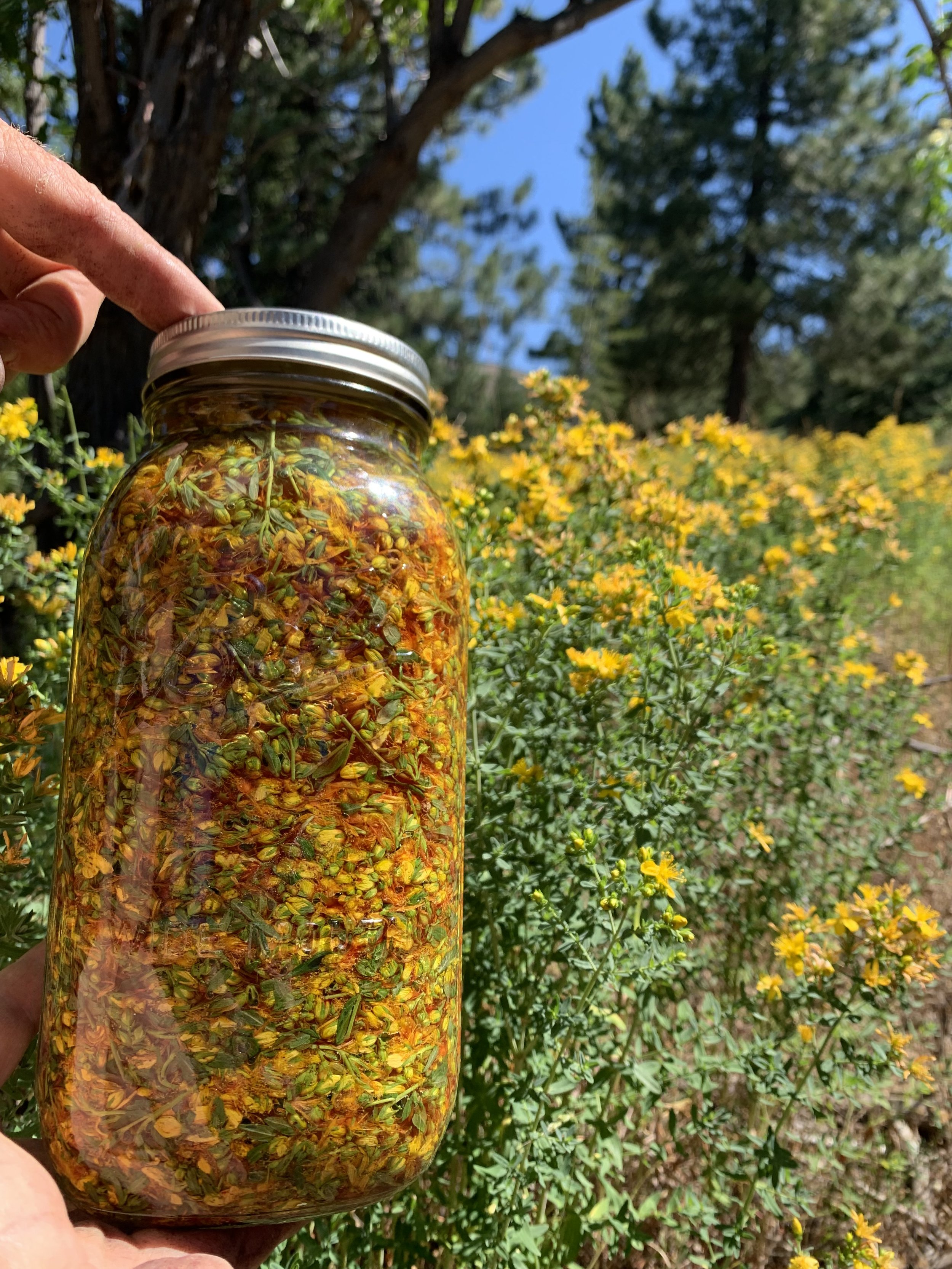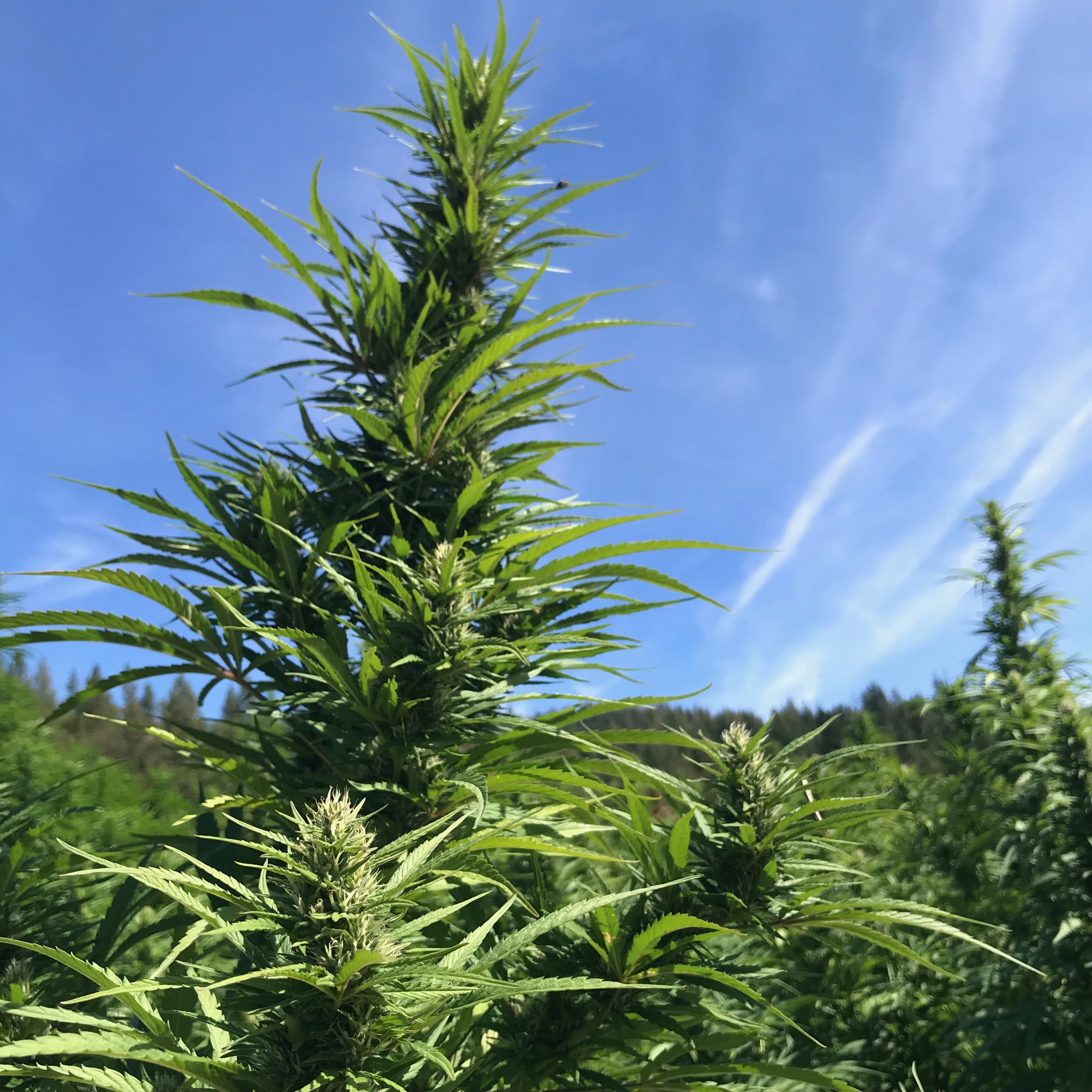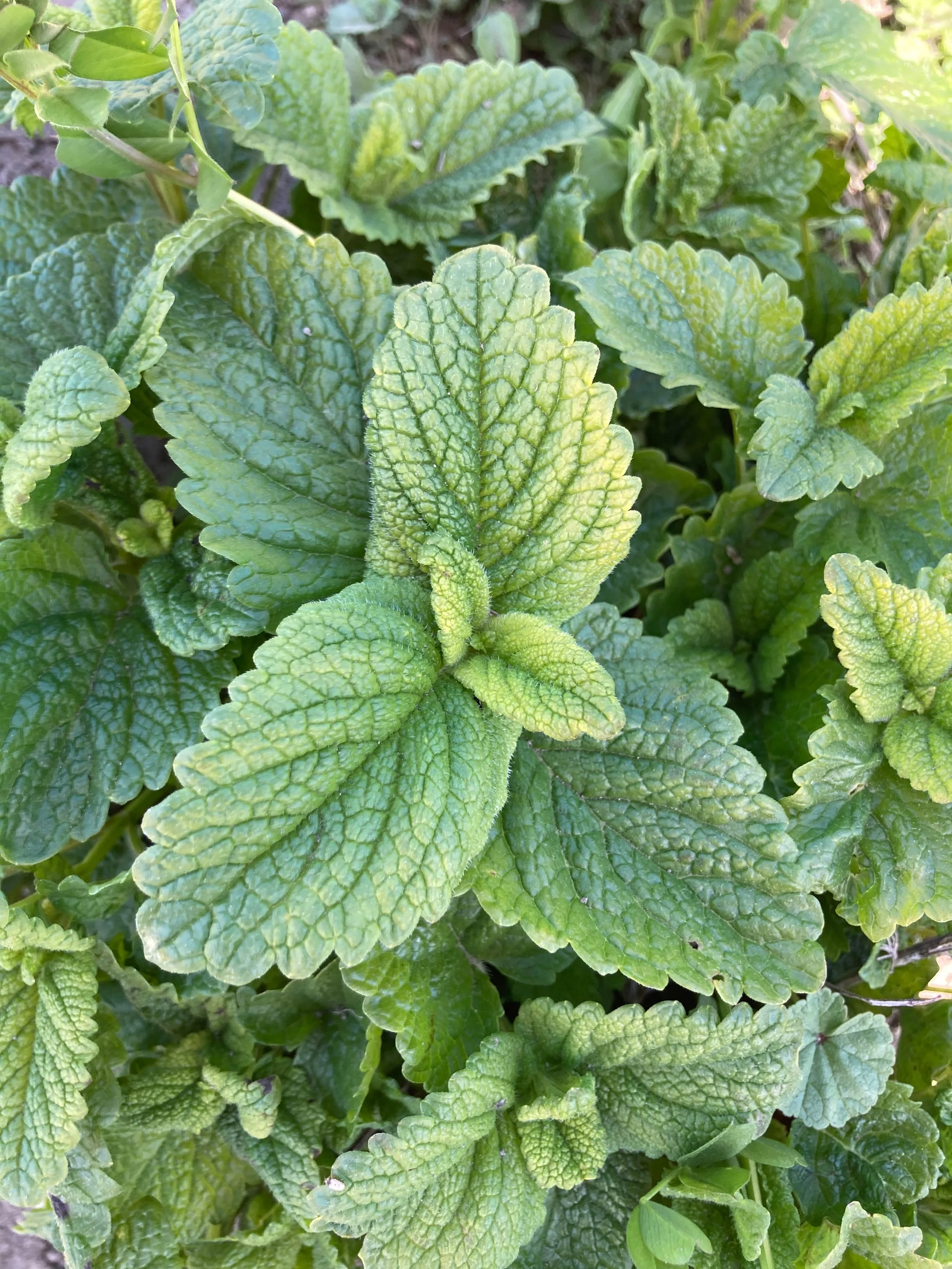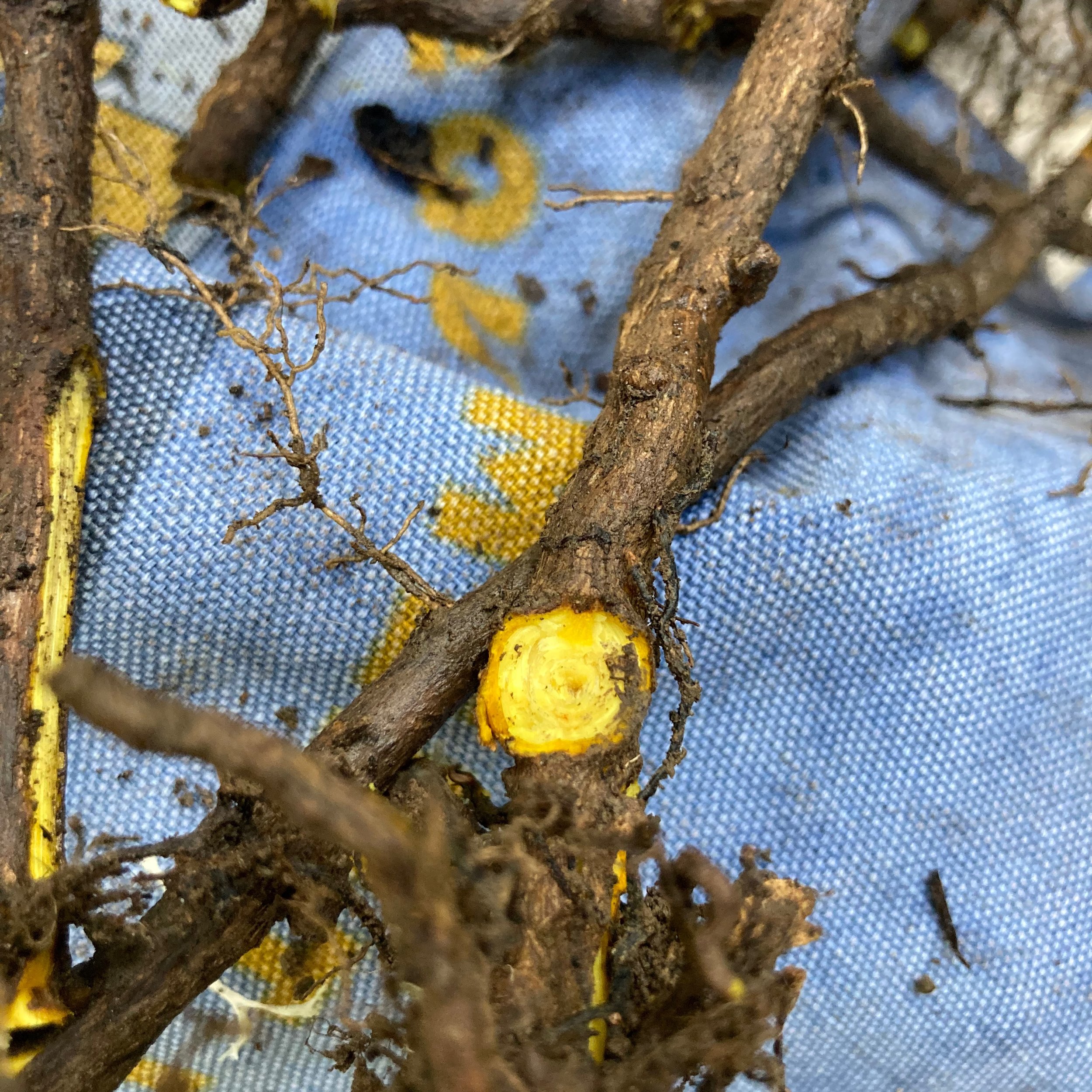Herbal Support for Sore Bodies
Sweet Relief
St. John’s Wort
One of the most common requests we get at our farmer’s market booth is for herbal pain relief. Whether it’s from working the body hard, tweaking or twisting a joint, healing from surgery, chronic conditions, a tension headache, or simply the stiffness and aches that often come with aging, pain is an inescapable part of the human experience. And, thankfully, the earth is wild garden teeming with herbs that want to help us manage our pain!
When folks ask for pain relief, we try to uncover the source of the pain. This is important because, unlike using over-the-counter painkillers to mask pain wherever it arises, herbal medicine has the potential to work with the conditions underlying the discomfort.
So, for example, if your pain is a headache or an earache that is actually connected to sinus congestion, we begin with drying herbs, like Goldenrod, to relieve the pressure. If, however, you are having nerve pain, I may recommend St. John’s Wort which helps repair damaged nerves and has a particular affinity for the sciatic nerve.
In addition to identifying the source of the pain, we will probably ask you to think about the role that inflammatory food and substances plays in your life. Sadly, no herb that I know of will eliminate pain if we’re also putting lots of sugar, caffeine, alcohol, gluten, dairy, red meat, and other inflammatory things into our bodies.
And as someone who would happily live on nothing but the above list, I wish this weren’t the case! So the sad news is that, if you are in chronic pain, or don’t want to be, you probably want to cut back on all those things in a big way. The good news is that, by doing so, you will feel SO MUCH BETTER! And herbal remedies will be a lot more effective at easing your pain.
There are a lot of herbs in our ecosystem and apothecary that can help, and below you can learn more about some of our favorites. Please note that, while herbal actions can be generalized, each human body responds slightly differently to each herb, so you may need to do some exploration to discover those that work best for you. All of the herbs below can be combined with one another, so you may want to mix and match to address the particular source and nature of your pain.
CBD Tincture and Salve
Organic CBD Hemp
Our full-spectrum, organic CBD tincture and salve are our most potent pain modulators. CBD offers anti-inflammatory actions for almost every system in the body, and we recommend it (and use it) for the potent pains born of injuries, overworked muscles, and menstrual cramps, as well as chronic inflammatory conditions like arthritis. When used together, the tincture can lower inflammation and bring relief to the whole body, while the salve can bring more immediate and focused ease to a particular part of the body. CBD also has a calming effect for most people, so it may reduce the anxiety caused by—and often at the root of—chronic pain.
California Poppy
California Poppy
This wild beauty is one of my favorite plants for an agitated nervous system, monkey mind, and sleep support, AND it can help soothe pain. I go to California Poppy for the kind of generalized pain I would pop an Ibuprofen for—headaches, menstrual cramps, toothaches, and bumps and bruises. Because it is a nervous system sedative, it can also be supportive for nerve-related pain. As an anti-spasmodic herb, it can help with belly cramps and spasmodic coughing, too. And because it helps calm the mind, it seems particularly excellent at helping me shift my relationship to the pain.
Incense Cedar
Incense Cedar
Incense Cedar can help relieve pain caused by sore muscles and connective tissue. You can make a tea out of the leaves and apply it as a compress to your sore areas. We use Incense Cedar essential oil in some of our Meadow Magic and CBD salves, and in our CTM liniment. In our experience, it seems to bring energy to constricted muscles and connective tissues and increases their pliability. Combined with CBD salve or Cottonwood Bud oil, it can be quite soothing for creaky muscles and joints.
Saint John’s Wort
St. John’s Wort Harvest
St. John’s Wort is most famous for its support with depressive moods, but there’s more to it! As a restorative nervine, St. John’s Wort can help relieve nerve pain by supporting the nerves to heal. The tincture can be taken internally to support the nerves systemwide and the blues that come with pain. An oil or salve of St. John’s Wort can also be applied directly to areas with nerve damage or pain for more focused repair and relief. We add it to our Twist and Shout Salve “for strains, sprains, pains, and breaks”, along with Cottowood Bud, Comfrey, Yarrow, and Bay oils. St. John’s Wort is also an anti-spasmodic, so it may help with pain related to spasmodic coughing, as well as belly and menstrual cramps.
Pedicularis
Pedicularis densiflora
Pedicularis is one of our favorite herbs of all! Pedicularis densiflora is our local species, and it has traditionally been used as muscle relaxant that helps with all kinds of tension-related emotional and physical discomforts. We recommend this for bodies that are sore from working too hard, pulled muscles, or general aches. As a gentle nervine, it can also be helpful for nerve pain and tension-related headaches and insomnia. Michael Moore also recommends taking a dose before getting bodywork to make the body more receptive to it.
P.S. Check out my recent wildcrafting adventure and learn to make Pedicularis tincture on our YouTube channel!
Cottonwood Bud
Cottonwood bud sticky with resin.
Like willow bark and many other riparian trees, Cottonwood Buds are rich in salicylic acid, the active component in aspirin. The tincture of cottonwood buds is thus a full-body anti-inflammatory, so it’s a good go-to for general pain. It also has a particular affinity for the joints, so we often recommend it for connective tissue and arthritic pain. I like to combine it with CBD and California Poppy for menstrual cramps, headaches, and other more intense and distracting pains. Additionally, cottonwood bud tincture can soothe sore throats and gums, promote productive coughing, and can be used as a mouthwash.
We also make a cottonwood bud oil that can be taken internally or externally. When used directly on the body, cottonwood bud oil can help ease muscle, joint, belly, or menstrual pain. It’s an excellent addition to therapeutic massages and it is amazing for the skin as well!
Tulsi
Tulsi
As an adaptogen, this deeeelicious herb helps the body manage daily stressors system-wide. Tulsi’s anti-inflammatory qualities can help ease pain all over the body, and its stress-relieving gifts can help decrease the anxiety that both contributes to and is caused by body pain. This is a great one to reach for on a daily basis for general wellbeing and to support you in feeling calm, clear, and bright.
Lemon Balm
Lemon balm
Like Tulsi, Lemon Balm is an amazing herb for the nervous system, and can help folks feel both calm and bright. It is a particular remedy for the herpes virus, so applying the tincture directly to a sore and taking it internally can help with the pain of outbreaks. It also can help with pain caused by nausea, gas, and bloating.
Goldenrod
Goldenrod
In my humble opinion, Goldenrod is one of the greatest secret treasures of herbal medicine! With a strong affinity for the urinary tract and kidneys, Goldenrod can help with pain associated with prolapse, bladder tissue damage, UTIs, and kidney stones. It is also has anti-spasmodic, anti-inflammatory qualities that can help soothe muscle and joint pain. And, as a bitter herb, it can help prevent or soothe belly pain caused by difficult digestion. As a decongestant, it can help soothe earaches and headaches caused by sinus congestion.
Oregon Grape Root
Oregon grape root harvest
As an excellent bitter herb that helps purify the blood and cleanse the liver, Oregon Grape Root can help relieve discomfort caused by painful digestion, constipation, or diarrhea. A recent customer whose gall bladder was removed reported that it greatly improved their digestion and decreased reflux. Because it helps cleanse the blood, Oregon Grape Root can resolve some skin issues and their associated pains, including eczema, rashes, and fungal outbreaks. It’s also a great go-to to prevent or treat hangovers. And, because so much of our wellbeing begins with our digestive health, Oregon Grape Root is a good one to take regularly to prevent the kind of generalized pain that comes from chronic inflammation and digestive woes.
References
de la Foret, Rosalee. 2024. Creative Ways to Work with Tulsi for Burnout. Podcast. https://www.herbalremediesadvice.org/podcast134.html
Justis, Angela. 2017. St. John’s Wort: Not Just for Depression. https://theherbalacademy.com/blog/st-johns-wort-not-just-depression/
Kloos, Scott. 2017. Pacific Northwest Medicinal Plants. Timber Press: Portland, Oregon.
Kusch, Sue. Information about Goldenrod. https://www.herbalremediesadvice.org/information-about-goldenrod.html
Purcell, JJ. 2015. The Herbal Apothecary: 100 Medicinal Herbs and How to Use Them. Timber Press: Portland, Oregon.
Popham, Sajah. 2018. Holy Basil: The Sacred Herb of Ayurveda. https://www.evolutionaryherbalism.com/2023/07/18/holy-basil/
Disclaimer
For educational purposes only. This information has not been evaluated by the Food and Drug Administration. This information is not intended to diagnose, treat, cure, or prevent any disease.











